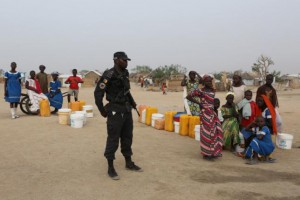A military approach, needed to be complemented by holistic means, followed by stabilisation measures to stop Boko Haram attacks, says top UN official
The threat that Boko Haram poses to the Lake Chad Basin region will not be defeated by military means alone, a top United Nations political affairs official has warned.
“To bring an end to the Boko Haram threat in the Lake Chad Basin region, affected countries must address the root causes that have contributed to the emergence of the group, including the social, economic and political grievances of marginalised communities,” Jeffrey Feltman, the UN Under-Secretary-General for Political Affairs told the UN Security Council (UNSC) in New York during an open debate on peace and security in Africa.
A military approach, while essential, needed to be complemented by holistic means, followed by stabilisation measures to stop Boko Haram attacks, said Feltman.
Attacks continue
Attacks by the militants continue, mainly in north-eastern Nigeria and southern Niger, and to a lesser extent, in northern Cameroon and the Lac region of Chad, said Feltman.
Despite commendable regional efforts, the group continues to threaten regional stability, as illustrated by the June 3 attack on a military base in Bosso town, south-eastern Niger.
The regional offensive involving Chadian, Cameroonian, Nigerian and Nigerien troops operating under the Multi-National Joint Task Force (MNJTF), has recaptured 80 percent of areas once under Boko Haram control, freed thousands of captives and prevented terrorist attacks.
Feltman said, however, that Lake Chad Basin countries had expressed their growing impatience over delays by international partners to support the MNJTF financially, as the Force’s success depends on timely and actionable intelligence, as well as specialised counter-terrorism skills and equipment, given the evolving tactics of Boko Haram.
More than 100 persons had to flee from one of the small islands in Lake Chad after Boko Haram insurgents attacked their village.
The UN and the five countries from the Sahel – Burkina Faso, Chad, Mali, Mauritania and Niger – will together produce the outline of a capacity building framework for counter-terrorism and prevention of violent extremism, including concrete regional projects, he said.
On the human rights front, Feltman said the UN has received reports of increased incidents of sexual and gender-based violence among the displaced. States must adopt measures to protect civilians and respect due process when dealing with persons arrested for Boko Haram-related charges.
Children used by Boko Haram should be treated as victims and dealt with in accordance with international standards for juvenile justice.
Economy devasted
The Boko Haram crisis has devastated the region’s economy. Economic growth dropped sharply with the decline of oil prices and other commodities.
Decreasing resources affected the states’ ability to deliver basic social services and to pay the salaries of security forces and civil servants.
Insecurity has disrupted trade routes between Chad and Nigeria, interrupting the supply of basic goods and producing price hikes.
Youth unemployment was at a worrisome high, providing recruitment ground for Boko Haram, Feltman noted.
Stephen O’Brien, Under-Secretary-General for Humanitarian Affairs and Emergency Relief Coordinator, stressed the need to urgently strengthen international attention on the “neglected” situation in the Lake Chad Basin, which hosts Africa’s fastest growing displacement crisis.
Humanitarian assistance
Across the Lake Chad Basin, the UN estimates that over nine million people need humanitarian assistance, said O’Brien. About 2.8 million of these people have been displaced, fleeing violent attacks in their towns and villages. Children are particularly vulnerable, especially the 1.7 million children who have been displaced across the Lake Chad Basin.
Nigeria is bearing the brunt of the crisis. Nigeria accounts for seven million of the nine million people in need across the Lake Chad Basin.
Last month, the Nigerian authorities rightly declared a nutrition emergency for Borno state. Reports from the field indicate that affected communities are rapidly running out of food.
mgafrica.com/



